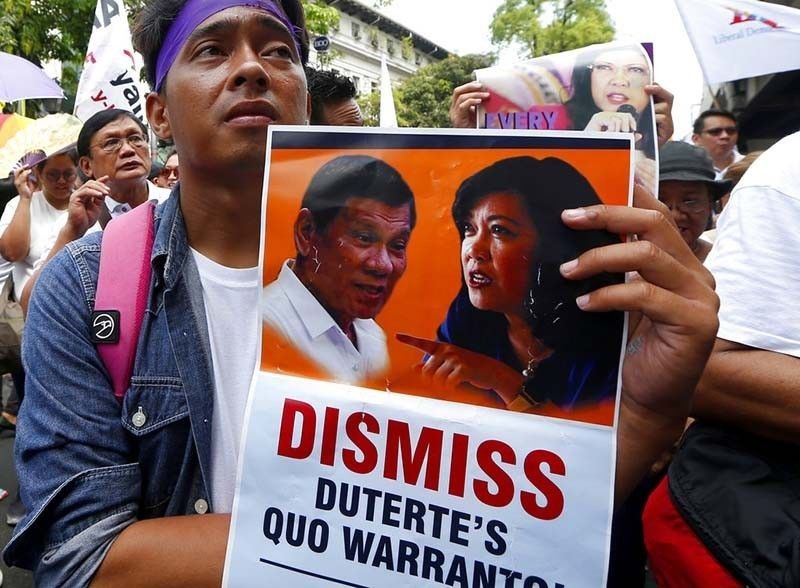Roque insists 'no new powers' on SolGen after quo warranto ruling

MANILA, Philippines — Presidential spokesperson Harry Roque dismissed criticism that the Supreme Court justices, through their quo warranto ruling, gave the Solicitor General new powers to wield against public officials.
In a press briefing on Tuesday, Roque said that the qualms of the dissenting justices on the “awesome powers” given to the solicitor general are “purely speculative.”
“What is clear is that the quo warranto was filed against a specific government official who was required to file her SALNs by virtue of the Constitution and the law,” Roque said.
“So if there was no violation against the Constitution, the solicitor general will not have this power [quo warranto]. It vests no new powers because it’s already there in the Constitution. The quo warranto,” the Palace spokesman added.
RELATED: Sereno may face disbarment for public remarks against SC
It took only two months for the high tribunal to rule on Solicitor General Jose Calida’s quo warranto petition against Sereno. The government ‘s chief legal counsel challenged the legality of Sereno’s appointment as chief justice.
On May 11, the SC voted 8-6 to remove Sereno as the head of the judiciary.
SC ruling
The tribunal granted Calida’s quo warranto petition that claimed that Sereno lacked “integrity” when she submitted only three SALNs in 2012, during the application for the chief justice position.
The SALN submission to the Judicial and Bar Council is not a Constitutional requirement, as Sereno pointed out in her defense.
The Constitution holds that: “A member of the Judiciary must be a person of proven competence, integrity, probity and independence.”
Under Rule 66 of the Rules of Court on quo warranto, the petition may be filed within one year after the cause of the ouster—an argument raised by Sereno in her defense and the Integrated Bar of the Philippines in its petition for intervention.
The SC, in its landmark ruling, said that time prescription “does not lie against the State.” Calida, when he challenged Sereno’s appointment, was invoking his power as the state’s chief legal counsel.
“Indeed, when the government is the real party in interest, and is proceeding mainly to assert its rights, there can be no defense of the ground of laches or prescription,” the decision penned by Associate Justice Noel Tijam reads.
Justices’ dissent, warning
Three justices, in their respective dissenting opinions, raised that the historic ruling awarded the solicitor general with powers to challenge the legality of appointments of several officers, including impeachable officers.
Associate Justice Marvic Leonen warned: “We render this Court subservient to an aggressive Solicitor General. We render those who present dissenting opinions unnecessarily vulnerable to powerful interests.”
He added that the government’s chief legal counsel, “who is not even a constitutional officer,” is given “awesome powers” with the SC’s decision.
Meanwhile, Associate Justice Alfredo Benjamin Caguioa said: “The ‘fear’ is based on the dangerous power the ponencia grants the present and future Solicitor General without any constitutional support.”
He stressed: “With such unfettered power, the balance of powers between the three coordinate departments unconstitutionally shifts, and the independence and stability of the Judiciary is eroded. This is where the danger lies.”
READ: Justice Caguioa: SC committed suicide sans honor with Sereno ouster
Associate Justice Mariano Del Castillo added that the “unfettered power of the Solicitor General” against impeachable officers undermines the independence of constitutional offices such as the judiciary.
“I find the Court’s assumption of quo warranto jurisdiction over impeachable officials alarming, especially in light of the powers which the ponencia ascribes to the Solicitor General to have with respect to proceedings of this nature,” Del Castillo added.
- Latest
- Trending





























